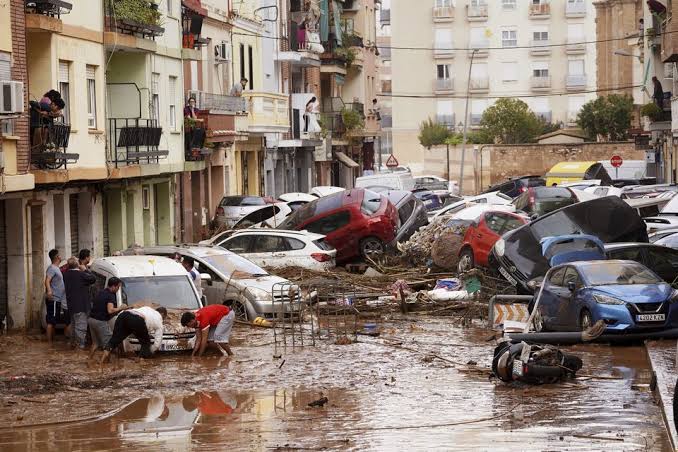
In a tragic turn of events, severe flooding in Spain has led to the deaths of at least 64 people in the eastern region of Valencia, marking the most deadly flooding incident in Spain in thirty years. Torrential rains hit the area on Tuesday, causing widespread destruction and leaving several areas inaccessible, according to local authorities on Wednesday.
Footage shows rescuers using dinghies overnight in the town of Utiel, where many residents were evacuated. Meteorologists reported that the region received an entire year’s worth of rain in just eight hours. This unprecedented rainfall hit Valencia’s farmland particularly hard, a region responsible for nearly two-thirds of Spain’s citrus production, making it one of the world’s top citrus suppliers.
One witness, Denis Hlavaty, shared his harrowing experience after becoming trapped in a gas station where he works. “It’s a river that came through. The doors were torn away and I spent the night there, surrounded by water that was 2 meters deep. I stayed on the top of a shelf, the only one left as the whole gas station had disappeared,” he recounted while still wearing his mud-stained uniform.
Regional leader Carlos Mazon addressed the situation, noting that some people remained isolated. “If (emergency services) have not arrived, it’s not due to a lack of means or predisposition, but a problem of access,” he explained, describing some areas as “absolutely impossible” to reach.
With at least 62 deaths reported in Valencia and two additional casualties in Castilla La Mancha, the flood has also caused significant disruption, including the cancellation of train services to Madrid and Barcelona and the suspension of schools and essential services in the worst-hit areas. Emergency services have urged residents to avoid travel, while the military deployed a specialized rescue unit to assist local teams.
Prime Minister Pedro Sanchez expressed solidarity with the victims, stating in a televised address, “For those who at this moment are still looking for their loved ones, the whole of Spain weeps with you.” The Spanish government has pledged to rebuild the devastated infrastructure.
The state weather agency AEMET issued a red alert on Tuesday as certain towns recorded over 400 mm of rain. The alert has since been reduced to amber as the storm moved northeast, prompting a red alert in Catalonia. This event marks the deadliest flood-related disaster in Spain since 1996 when floods claimed 87 lives near the Pyrenees.
European Commission President Ursula von der Leyen expressed support on X, saying, “What we’re seeing in Spain is devastating.” Additionally, ASAJA, one of Spain’s largest farmer groups, highlighted expected severe crop damage. As Europe’s largest exporter of fresh and dried oranges, Spain’s citrus production—primarily centered in Valencia—could face significant setbacks.
Meteorologists attribute the severity of this storm to climate change, suggesting that the warming Mediterranean Sea is intensifying rainfall. Senior meteorologist Ernesto Rodriguez Camino explained, “Events of this type, which used to occur many decades apart, are now becoming more frequent, and their destructive capacity is greater.”








